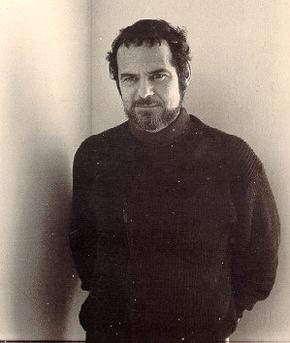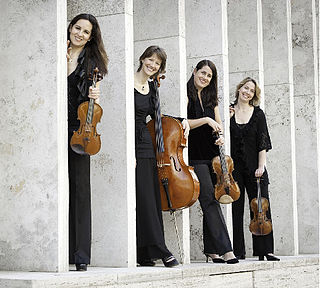External links
- "Aaron Jay Kernis : String Quartet No. 2, 'musica instrumentalis'", G. Schirmer Inc.
- "Prizing the Pulitzer", CoriglianoQuartet.com.
| Orchestral |
|
|---|---|
| Concerto |
|
| Chamber |
|
Pulitzer Prize for Music (1991–2000) | ||
|---|---|---|
| ||
| International | |
|---|---|
| National | |
| Other | |
String Quartet No. 2, Musica Instrumentalis (1997) [1] is a string quartet by Aaron Jay Kernis (b. 1960), inspired by renaissance and baroque dances, [1] composed for the Lark Quartet and awarded the Pulitzer Prize in 1998, [2] with a special citation to George Gershwin. [3] His first quartet being named Musica celestis:
My new string quartet started off because I wanted to deal with baroque dance forms and medieval dance rhythms. There wasn't an image—it developed from purely musical ideas. This was a case where the piece turned out to be formally very different from what I first expected. I thought it would be five movements, but I started cannibalizing one movement into another and wound up with three. The first movement is like a dance medley, with a first big A section and a closing A section that is a development of the opening medley. Stuck in the middle of these two A's is a minuet and trio that originally was an entirely separate movement. While working on the first movement, I decided that the relaxation that I needed between those A sections was one of the smaller movements I'd already conceived. So I took one and squashed it in. That's one way that a piece can become significantly transformed during the act of composition.
— Kernis (2003), [4]
The piece was premiered by the Lark Quartet in January 1998 at Merkin Concert Hall. [5] It has been recorded by the Lark Quartet and Jasper String Quartet.
It was commissioned by the Lark Quartet by the Elaine Kaufman Cultural Center in New York City, Ohio University, and The Schubert Club of St. Paul, with additional funds from Chamber Music America. It is dedicated to Linda Hoeschler "in gratitude for her friendship, generosity, and support, and in honor of her perpetual faith in the creative spirit."

Chamber music is a form of classical music that is composed for a small group of instruments—traditionally a group that could fit in a palace chamber or a large room. Most broadly, it includes any art music that is performed by a small number of performers, with one performer to a part. However, by convention, it usually does not include solo instrument performances.

The Pulitzer Prize for Music is one of seven Pulitzer Prizes awarded annually in Letters, Drama, and Music. It was first given in 1943. Joseph Pulitzer arranged for a music scholarship to be awarded each year, and this was eventually converted into a prize: "For a distinguished musical composition of significant dimension by an American that has had its first performance in the United States during the year."
Shulamit Ran is an Israeli-American composer. She moved from Israel to New York City at 14, as a scholarship student at the Mannes College of Music. Her Symphony (1990) won her the Pulitzer Prize for Music. She was the second woman to win the Pulitzer Prize for Music, the first being Ellen Taaffe Zwilich in 1983. Ran was a professor of music composition at the University of Chicago from 1973 to 2015. She has performed as a pianist in Israel, Europe and the U.S., and her compositional works have been performed worldwide by a wide array of orchestras and chamber groups.
Aaron Jay Kernis is a Pulitzer Prize- and Grammy Award-winning American composer serving as a member of the Yale School of Music faculty. Kernis spent 15 years as the music advisor to the Minnesota Orchestra and as director of the Minnesota Orchestra's Composers' Institute, and is currently the workshop director of the Nashville Symphony Composer Lab. He has received numerous awards and honors throughout his thirty-five-year career. He lives in New York City with his wife, pianist Evelyne Luest, and their two children.

The String Quartet No. 14 in D minor, D 810, known as Death and the Maiden, is a piece by Franz Schubert that has been called "one of the pillars of the chamber music repertoire". It was composed in 1824, after the composer suffered from a serious illness and realized that he was dying. It is named for the theme of the second movement, which Schubert took from a song he wrote in 1817 of the same title. But, writes Walter Willson Cobbett, all four movements of the quartet are welded "into a unity under the pressure of a dominating idea - the dance of death."

The Grosse Fuge, Op. 133, is a single-movement composition for string quartet by Ludwig van Beethoven. An immense double fugue, it was universally condemned by contemporary music critics. A reviewer writing for the Allgemeine musikalische Zeitung in 1826 described the fugue as "incomprehensible, like Chinese" and "a confusion of Babel". However, critical opinion of the work has risen steadily since the early 20th century and it is now considered among Beethoven's greatest achievements. Igor Stravinsky described it as "an absolutely contemporary piece of music that will be contemporary forever".
A listing of the Pulitzer Prize award winners for 1998:

Barbara Kolb was an American composer and educator, the first woman to win the Rome Prize in musical composition. Her music features sound masses of colorful textures, impressionistic sounds and atonal vocabulary, with influences from literary and visual arts. She taught at the Third Street Music School Settlement, Rhode Island College and Eastman School of Music.

Stephen Joel Albert was an American composer. He is best known for his Pulitzer Prize winning Symphony No. 1 RiverRun (1983) and his Cello Concerto (1990), written for Yo-Yo Ma. He died suddenly in a 1992 automobile accident, having just sketched out his Second Symphony. The work was subsequently completed by Sebastian Currier, and his death sparked musical tributes from composer colleagues such as Aaron Jay Kernis and Christopher Rouse.

The six string quartets Op. 20 by Joseph Haydn are among the works that earned Haydn the sobriquet "the father of the string quartet". The quartets are considered a milestone in the history of composition; in them, Haydn develops compositional techniques that were to define the medium for the next 200 years.
Chamber Music America (CMA) is an American non-profit organization that provides small ensemble professionals with access to a variety of professional development, networking, and funding resources. CMA's regular initiatives include grants, awards, and commissioning programs for ensembles and presenters, a national conference held annually in New York City, and the publication of Chamber Music magazine. CMA-members organizations and individuals include ensembles, musicians, concert presenters, artist managers, composers, educators, and others involved in the performance of classical, jazz, contemporary, and world music.

La hija de Cólquide is a ballet score composed by Carlos Chávez in 1943–44 on commission from the Elizabeth Sprague Coolidge Foundation for Martha Graham. The title refers to the mythological character Medea, daughter of King Aeëtes of Colchis, in the story of Jason and the Golden Fleece. The ballet spawned several subsidiary works in Chávez's catalog including his Third String Quartet. When Graham eventually choreographed it, she wrote a new scenario and gave it the title Dark Meadow.
The Jasper String Quartet is a professional string quartet based in Philadelphia, Pennsylvania. Currently the Ensemble in Residence at Temple University's Center for Gifted Young Musicians, the quartet was previously the Quartet in Residence at Oberlin Conservatory. Formed in 2004 while its members were in school at Oberlin Conservatory, the quartet completed string quartet master's programs at Rice University (2006–2008) and Yale University (2008–2010). The group's primary mentors are James Dunham, Norman Fischer and the Tokyo String Quartet. In 2010, they joined the roster of Astral Artists.
Pieces of Winter Sky is a composition for chamber ensemble by the American composer Aaron Jay Kernis. The work was commissioned by the consortium Music Accord for the ensemble eighth blackbird. The piece was a runner-up for 2013 Pulitzer Prize for Music, losing to Caroline Shaw's Partita for 8 Voices.
Still Movement with Hymn is a composition for piano quartet by the American composer Aaron Jay Kernis. It was composed in 1993 and was given its world premiere at Princeton University on November 11, 1993. It is dedicated to the memory of the composer Stephen Albert, who died unexpectedly in 1992. The piece was a finalist for the 1994 Pulitzer Prize for Music.
The String Quartet No. 3 is a composition for string quartet by the composer Karel Husa. It was first performed on October 14, 1968, at the Goodman Theatre, Chicago, by the Fine Arts Quartet, to whose members the work is dedicated. The piece won the 1969 Pulitzer Prize for Music.
The Flute Concerto is a composition for flute and orchestra by the American composer Aaron Jay Kernis. The work was jointly commissioned for the flautist Marina Piccinini by the Detroit Symphony Orchestra, the Rochester Philharmonic Orchestra, the Chautauqua Institution, and the Peabody Conservatory of Music. It was first performed in Detroit on January 21, 2016, by Piccinini and the Detroit Symphony Orchestra conducted by Leonard Slatkin. The piece is dedicated to Marina Piccinini "with warmth and admiration."

The Lark Quartet was a New York-based, all female string quartet that operated from 1985 to 2019. It is acknowledged for its distinguished contribution to the string quartet repertoire, commissioning new works from some of America's most celebrated composers. Most notably, Aaron Jay Kernis' two string quartets: Quartet no. 1 Musica celestis and Quartet no. 2 Musica instrumentalis, which received the Pulitzer Prize in 1998. The Lark Quartet served as Quartet-in-Residence at the University of Massachusetts Amherst from 2004 to 2008 and has recorded numerous albums on multiple labels including Decca/Argo, Arabesque, Bridge, ERI, Endeavor and Koch.
String Quartet No. 1 in B-flat major "Maori Quartet", Stiles 1.2.3.3 SQ1 is the first of Alfred Hill's seventeen string quartets. Its composition began before 1892, it was completed after 1896 and premiered only on 18 May 1911 in Sydney.